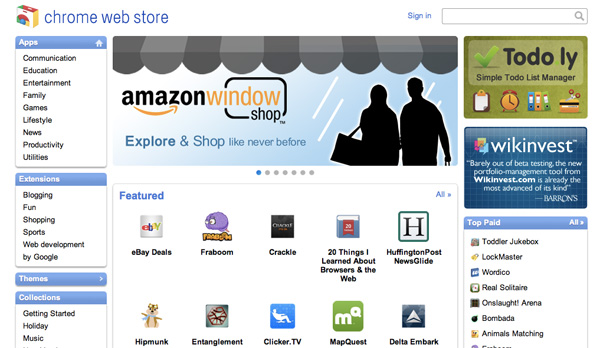Anand's Thoughts on Google's Chrome OS
by Anand Lal Shimpi on December 8, 2010 6:23 PM ESTApps
Google’s Chrome web store is already fully functional and works with existing installations of the Chrome browser on Windows or Mac platforms. Chrome OS notebooks will run the very same apps.
These are web based apps however they can support an offline mode, choosing to sync data when an internet connection becomes available again. As I mentioned earlier, Google imposes stipulations on what can be published to the Chrome web store. The limitations are as follows:
Applications may not contain sexually explicit material, depict violent or bullying behavior, hate speech, impersonation or deceptive behavior, unauthorized publishing of personal and confidential information (no Wikileaks Chrome app I guess), infringe on intellectual property rights of others, engage in illegal activities, facilitate online gambling, contain malicious products (e.g. viruses, malware), violate third party terms of service or enable unauthorized download of streaming content or media. The full list is pretty well defined and there’s nothing too unusual.
Google, like most platform owners, is simply trying to keep the web store clean, legal and devoid of any harmful software.

Since these are all web based apps, you can not only sync your apps across multiple systems but all of your data within the apps. It’s currently all tied together using your Google account, so any Chrome notebook or Chrome browser instance that you give your Google account information to will have an up-to-date list of your apps, extensions and settings. Removing an app on one Chrome platform will remove it from all, automatically.
Document and data syncing should also seamless as everything is stored in the cloud. You ultimately have to entrust Google with everything but for those who feel comfortable doing so or who already do, it’s a definite benefit of the platform. By contrast, syncing applications and data across multiple PCs or Macs isn’t nearly as easy or as free.










104 Comments
View All Comments
Hrel - Monday, December 13, 2010 - link
I thought Microsoft was going to do that Sandboxed browser/apps thing way back when Vista came out. I remember specifically reading that that was one of the features of Vista and why it was so important to make sure your CPU supported virtualization.Alas that never came to pass; now we're here in Windows 7 reading leaked info about Windows 8 and it STILL hasn't happened. For shame $soft, for shame.
rscoot - Monday, December 13, 2010 - link
The "I'm not an idiot, so I don't need to run antivirus" opinion is horribly outdated. With as many 0 day exploits and drive by hijackings from legitimate websites you can't just say, "I don't search for horse porn and download warez I'm ok" anymore. Unless you don't use any PDF or Flash software (just for a couple of examples) on your PC, you are going to be at risk. Is your risk as high as the average user's? Of course not, but considering how cheap good antivirus software is (Microsoft Security Essentials is free and low footprint), the only reason not to run AV is to cultivate the smug attitude that you're better than people who choose to protect themselves.TantrumusMaximus - Tuesday, December 14, 2010 - link
To all of you who commented on the fact Google will house all your personal information... "I SALUTE YOU"I love my right, my personal right TO USE A CAPS LOCK key when I want to.
I love my right on my PC - PERSONAL Computer to do things "I" want to do today without handing my data to big brother to review every last action I make.
This world is soooooo moving towards the evil futures in many movies where the government makes all your choices for you, knows when you wipe your a$$, knows when you banged your wife, knows all.
SCREW THIS. I hope it burns.
has407 - Saturday, January 1, 2011 - link
Anand -- Thanks again for the food for thought. I too am impatient to get to the end of the story. But I think the trajectory is ordained; timing is the only question. (Timing, not trajectory, seems to always be the most difficult. I remember pontificating in 1998 that, "with 2MBps ubiquitous connectivity, I could jettison most of the weight, power and data storage I have to lug around with my laptop--which is always out of sync with my other machines--grrr. We should be there by 2004-2005". Hah! ever the techno-optimist. :)Will it replace everything else? No. But IMHO that is irrelevant. The relevant question is: Where will the growth be in the coming years? That growth will be--and demonstrably has been for some time--in services and apps that are web-based or anytime/anywhere (which is simply another way of saying "cloud-based"). That's where the developers and development $ will go, because that's what the vast majority of people want and expect (and will increasingly want and expect).
Yeah, I'll still have my home-based Linux/Win/etc infrastructure, but for most tasks I don't need it, don't (and can't) want to have to lug it around when mobile. That's speaking as an individual... From a corporate perspective there are plenty of options, e.g., "hybrid clouds". But the hard facts are that most organizations--especially smaller organizations--can't provide equivalent SLA's or performance at equivalent cost as public cloud. The differences in economies are off-the-charts compared to what any but the largest organizations can achieve.
See, e.g., "Above the Clouds: A Berkeley View of Cloud Computing":
http://www.eecs.berkeley.edu/Pubs/TechRpts/2009/EE...
Maybe there will be a swing of the pendulum back towards something like "person clouds", but my crystal ball doesn't go that far out. :)